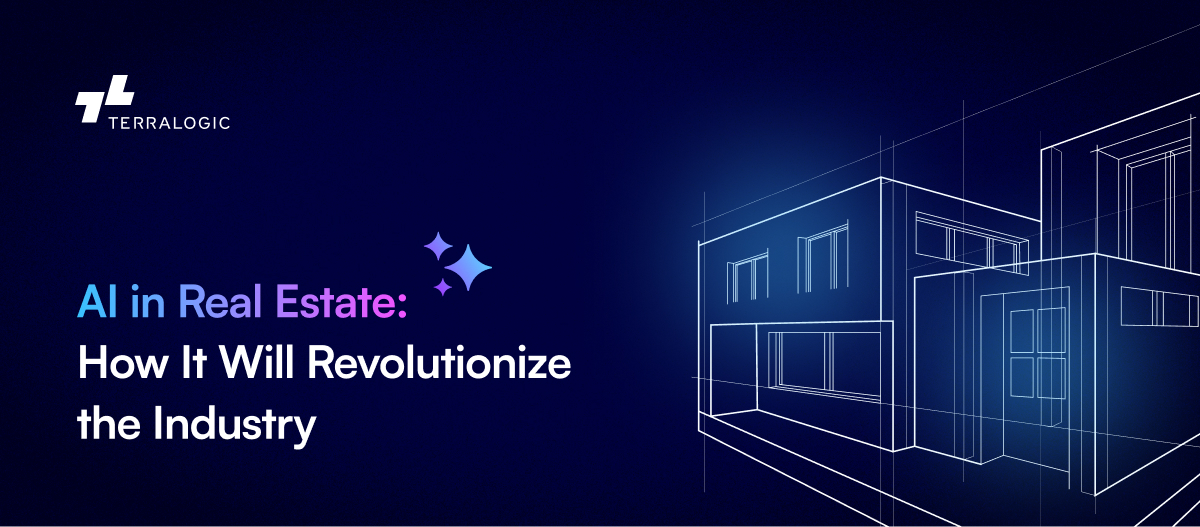AI in Real Estate: How IT Will Revolutionize the Industry
January 21, 2025

“Based on work by the McKinsey Global Institute (MGI), we believe that Gen AI could generate $110 billion to $180 billion or more in value for the real estate industry.” – McKinsey
Artificial intelligence is changing the era of real estate and the scope of its operational process is expanding to unprecedented efficiency and innovation, from smart real estate tools that streamline intelligent property systems to sophisticated algorithms that can forecast market trends. Artificial intelligence in real estate automates and empowers its stakeholders with data-driven insights.
Machine learning in real commercial estate is significant in analyzing vast datasets and recognizing patterns to optimize pricing and enhance decision-making processes. In this blog, we will discuss all the aspects of using AI in real estate and how it can transform your real estate business.
How Are Artificial Intelligence in Real Estate and Machine Learning Transforming the Industry?
Artificial intelligence and machine learning are transforming the real estate industry by improving efficiency, accuracy, and personalization. From smarter property searches to automated management systems, AI in real estate has become essential for modern strategies. Let’s explore this in detail.
The Role of Artificial Intelligence and Machine Learning in Real Estate
Artificial intelligence and machine learning have become integral to enhancing commercial real estate efficiency. From smarter property searches to automated management systems, AI in property management and research is now a critical component of strategies. Artificial intelligence in real estate with its potential has been estimated to reach US $1803.45Bn by 2030 at a CAGR of 35% during the forecast period.
Predictive Analytics for Market Trends and Property Valuation
Intelligent Property Systems have transformed the valuation of real estate by using smart projections, thereby self-augmenting the process. AI-driven algorithms analyze vast datasets, including recent sales, location specifics, and neighborhood trends.
In contrast to traditional time-consuming approaches, AI-powered algorithms quickly assess historical sales, property conditions, neighborhood dynamics, crime rates, and current market trends in a few minutes. For instance, AI-powered real estate solutions like Zillow leverage ai to provide “Zestimates.” It provides insights that adapt to market fluctuations.
Improving Customer Experiences with AI-Driven Solutions
AI-based chatbots and virtual assistants are changing the way customers interact with real estate. Using predictive analytics and artificial intelligence for real estate leads, these intelligent bots offer 24/7 service support. AI chatbots can handle tasks like responding to questions, sharing property information, and scheduling viewings more effectively.
Then it analyzes customer preferences for personalization and will help streamline a property search process into a seamless, efficient, and engaging experience for buyers and renters.
Automated Property Management and Maintenance Insights
Smart real estate technology is changing the way by streamlining mundane exercises such as scheduling property viewings, responding to inquiries, rent collection, maintenance requests, tenant communication, and managing administrative processes. This saves significant time, allowing real estate professionals to focus on complex roles such as negotiations, strategic activities, enhancing tenant satisfaction, and building strong client relationships more efficiently.
Tenants can submit maintenance requests online, which artificial intelligence automatically routes to the appropriate service providers. By enhancing operational efficiency, smart technology equips professionals to deliver better service and direct value creation within the competitive market for real estate.
Virtual Tours and Enhanced Property Visualization through ML
Virtual tours and enhanced property picturing through machine learning (ML) are shifting the commercial real estate industry by providing immersive, personalized experiences for potential buyers. Virtual property tours have transitioned from basic 360-degree images to sophisticated, AI-driven experiences that allow potential buyers to explore properties remotely. The integration of virtual reality (VR) and augmented reality (AR) enhances the engagement level, making property exploration more interactive and informative.
Artificial intelligence can adjust the tour actively based on user inquiries. If a buyer shows interest in energy-efficient features, the tour can immediately shift focus to showcase solar panels or smart home technology. These technologies not only enhance the buyer experience through personalized and immersive tours but also provide real estate agents with critical insights to optimize their strategies.
How Chatbots and Virtual Assistants Enhance Client Interaction
Chatbots and virtual assistants are increasingly enhancing client interaction by streamlining communication and improving customer services and experiences in the real estate sector. Chatbots provide round-the-clock support, ensuring that clients can receive assistance at any time, regardless of time zones or business hours. Using advanced algorithms and natural language processing (NLP), chatbots can analyze client data to offer tailored responses and recommendations.
Chatbots can manage a high volume of inquiries simultaneously, directing clients to the appropriate resources or human agents when necessary. Virtual assistants guide clients through real estate websites or applications, helping them navigate services and find information quickly. By simplifying the user journey, smart real estate tools enhance engagement and reduce frustration during interactions.
The integration of chatbots and virtual assistants into client interaction strategies significantly enhances customer engagement by providing instant support, personalized experiences, and efficient service management.
AI-Powered Investment Strategies and Risk Assessment
AI-powered investment strategies and risk assessment in real estate are significantly enhancing how investors approach the market. Using artificial intelligence in real estate utilizes predictive analytics to forecast market trends and real estate property values by analyzing vast amounts of historical and current data. This allows investors to identify promising opportunities.
For instance, AI property analysis will help to predict future property values with a high degree of accuracy. Artificial intelligence and machine learning property valuation can optimize rental pricing based on various factors, such as local demand, seasonality, and property conditions. Furthermore, it enhances the property search process by matching listings with an investor’s specific criteria.
Risk assessment through artificial intelligence in real estate has become much easier. AI uses real-time data and historical trends to provide more accurate estimates of a property’s worth. It can analyze multiple variables affecting investment outcomes, including economic indicators, market conditions, and property-specific factors. An intelligent property system. This will allow investors to consider all risk-taking factors and help them to make data-driven decisions that maximize returns while minimizing risk.
Streamlining Transactions and Reducing Paperwork with AI
Artificial intelligence in real estate revolutionized the game concerning business transactions because it overcomes delays associated with heavy paperwork and bureaucratic efforts. AI-based applications such as contract review and analytic systems can scan and read significant information from long legal documents quickly. They identify crucial clauses, obligations, and risks and establish them against industry benchmarks and standards for easy comparison.
As a result, the transactions are more efficient, error-free, and quicker with minimal hassles on behalf of the parties involved.
The Impact of Machine Learning on Real Estate Pricing Models
The integration of machine learning (ML) in smart real estate technology has redefined pricing models, making them more accurate, efficient, and flexible. By utilizing advanced algorithms like neural networks and Random Forest, ML enhances predictive accuracy, often achieving errors below 6%.
Key Contributions of Machine Learning in Real Estate Pricing Models
- Enhanced Predictive Accuracy: A study indicated that ML models can achieve an absolute error below 4% for residential properties and below 6% for commercial properties, outperforming conventional appraisal methods
- Dynamic pricing models: It is powered by ML and adjusts in real-time to market trends, buyer behaviors, and seasonal changes, optimizing rental and sale prices. Automation through Automated Valuation
- Automation and Efficiency: In the real estate automation part, automated valuation models (AVMs) powered by machine learning streamline the property valuation process by reducing the time and human error associated with traditional appraisals.
- Feature Engineering and Model Optimization: Feature engineering and configuration tuning are vital in ML for real estate pricing, refining variables to enhance model accuracy and precision.
Challenges and Future Prospects of AI and ML in Real Estate
AI and ML in real estate face challenges like inconsistent data, making it hard to develop accurate models. Privacy concerns around sensitive customer data require compliance with regulations such as GDPR and CCPA. Algorithmic bias is also a risk, as AI systems may perpetuate existing biases in property valuations or tenant screening. High initial costs and resistance from industry professionals hinder adoption, especially for smaller firms.
Despite these challenges, AI and ML offer significant potential in real estate. They will automate tasks like property management and communication, improving operational efficiency. Predictive analytics in real estate will enhance decision-making and reduce investment risks, while automated valuation models (AVMs) will provide faster and more accurate property valuations.
AI’s ability to personalize customer services and experiences will drive satisfaction and growth, and increased accessibility will encourage innovation across smaller firms and new markets.
Conclusion
Artificial intelligence in real estate would transform the industry into an efficient, customer-centric, and data-driven world. From automating mundane tasks to predicting market trends, from security enhancement to the streamlining of transactions, AI is enhancing the facets of the real estate industry and empowering professionals by providing actionable insights and uplifting customer experiences through personalized solutions.
As technology advances, adopting it becomes essential for real estate companies to stay competitive. The future promises to be an AI-integrated industry where real estate processes will be much quicker, smarter, and much more transparent opportunities for maximal growth.
Keep reading about
LEAVE A COMMENT
We really appreciate your interest in our ideas. Feel free to share anything that comes to your mind.
Our 16 years of achievements includes:
-
10M+
lines of codes
-
2400+
projects completed
-
900+
satisfied clients
-
16+
countries served




